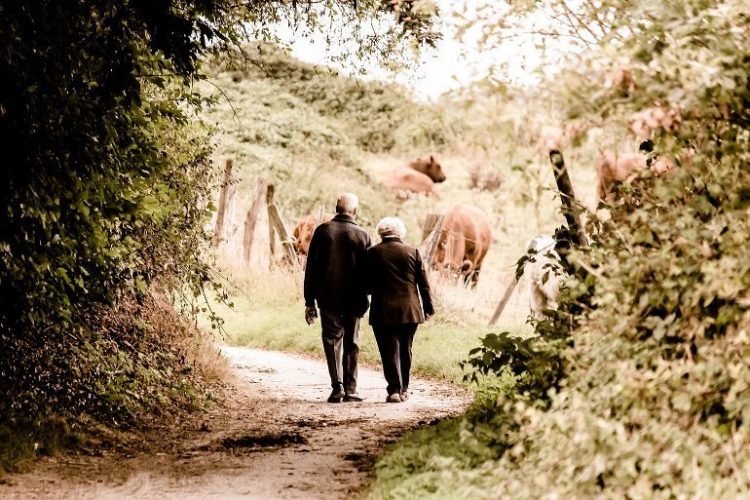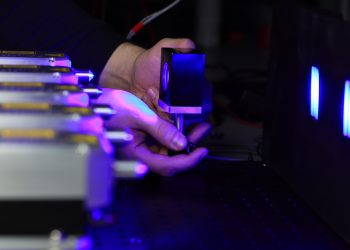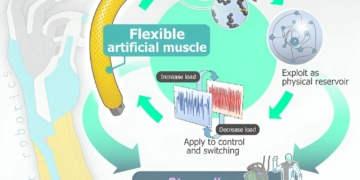Summary: A new study found a causal link between brisk walking and telomere length. Researchers found that 10 minutes of brisk walking per day was associated with longer life expectancy, and brisk walkers have up to 20 years’ greater life expectancy than those who walk slowly.
Source: University of Leicester
A new study of genetic data published today (Wednesday) of more than 400,000 UK adults has revealed a clear link between walking pace and a genetic marker of biological age.
Confirming a causal link between walking pace and leucocyte telomere length (LTL) – an indicator of biological age – the Leicester-based team of researchers estimate that a lifetime of brisk walking could lead to the equivalent of 16 years younger biological age by midlife.
Researchers from the University of Leicester at the National Institute for Health Research (NIHR) Leicester Biomedical Research Centre studied genetic data from 405,981 middle-aged UK Biobank participants and found that a faster walking pace, independent of the amount of physical activity, was associated with longer telomere.
Telomeres are the ‘caps’ at the end of each chromosome, and hold repetitive sequences of non-coding DNA that protect the chromosome from damage, similar to the way the cap at the end of a shoelace stops it from unravelling.
Each time a cell divides, these telomeres become shorter – until a point where they become so short that the cell can no longer divide, known as ‘replicative senescence’. Therefore, scientists consider LTL a strong marker for ‘biological age’, independent from when an individual was born.
Although the relationship between telomere length and disease is not fully understood, the build-up of these senescent cells is believed to contribute to a range of symptoms we associate with aging, such as frailty and age-related diseases.
While the physical, mental, social and health benefits of walking are well-documented, this study is one of the first of its kind to compare genetic data with both self-reported walking speeds, as well as actual measurements of movement intensity from wearable activity tracking devices worn by participants.
Dr Paddy Dempsey is a Lecturer and Research Fellow at the University of Leicester and within the NIHR Leicester Biomedical Research Centre, part of the University Hospitals of Leicester (UHL) NHS Trust, and lead author on the study published in Communications Biology. He said:
“Previous research on associations between walking pace, physical activity and telomere length has been limited by inconsistent findings and a lack of high-quality data.
“This research uses genetic data to provide stronger evidence for a causal link between faster walking pace and longer telomere length. Data from wrist-worn wearable activity tracking devices used to measure habitual physical activity also supported a stronger role of habitual activity intensity (e.g. faster walking) in relation to telomere length.
“This suggests measures such as a habitually slower walking speed are a simple way of identifying people at greater risk of chronic disease or unhealthy ageing, and that activity intensity may play an important role in optimising interventions.
For example, in addition to increasing overall walking, those who are able could aim to increase the number of steps completed in a given time (e.g. by walking faster to the bus stop). However, this requires further investigation.”
Researchers from the University of Leicester have previously shown using UK Biobank that as little as 10 minutes of brisk walking a day is associated with longer life expectancy, and that brisk walkers have up to 20 years’ greater life expectancy compared to slow walkers.
This new study demonstrates a causal link between brisk walking and telomere length and, significantly, not the other way round.
Tom Yates, senior author and Professor of Physical Activity, Sedentary Behaviour and Health at the University of Leicester and NIHR Leicester Biomedical Research Centre, added:
“Whilst we have previously shown that walking pace is a very strong predictor of health status, we have not been able to confirm that adopting a brisk walking pace actually causes better health. In this study we used information contained in people’s genetic profile to show that a faster walking pace is indeed likely to lead to a younger biological age as measured by telomeres.”
Funding: The study was funded by the UK Medical Research Council, Biotechnology and Biological Sciences Research Council, British Heart Foundation, and supported by the NIHR Leicester BRC – a partnership between Leicester’s Hospitals, the University of Leicester and Loughborough University.
About this aging research news
Author: Jonathan Whitney
Source: University of Leicester
Contact: Jonathan Whitney – University of Leicester
Image: The image is in the public domain
Original Research: Open access.
“Investigation of a UK biobank cohort reveals causal associations of self-reported walking pace with telomere length” by Paddy Dempsey et al. Communications Biology
Abstract
Investigation of a UK biobank cohort reveals causal associations of self-reported walking pace with telomere length
Walking pace is a simple and functional form of movement and a strong predictor of health status, but the nature of its association with leucocyte telomere length (LTL) is unclear.
Here we investigate whether walking pace is associated with LTL, which is causally associated with several chronic diseases and has been proposed as a marker of biological age. Analyses were conducted in 405,981 UK Biobank participants.
We show that steady/average and brisk walkers had significantly longer LTL compared with slow walkers, with accelerometer-assessed measures of physical activity further supporting this through an association between LTL and habitual activity intensity, but not with total amount of activity. Bi-directional mendelian randomisation analyses suggest a causal link between walking pace and LTL, but not the other way around.
A faster walking pace may be causally associated with longer LTL, which could help explain some of the beneficial effects of brisk walking on health status.
Given its simple measurement and low heritability, self-reported walking pace may be a pragmatic target for interventions.















